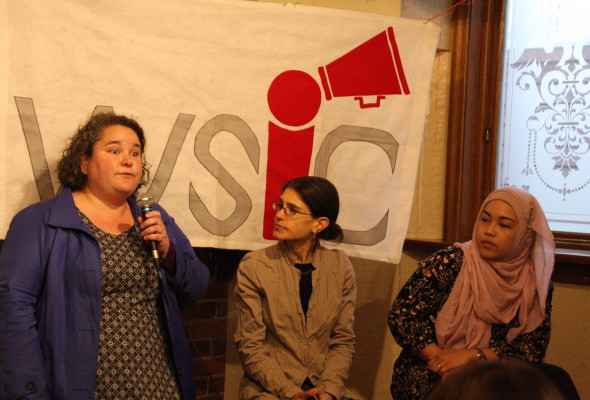By Anastasia Gal
In Indonesia, there is a legend about crying rice. A rice farmer was harvesting her crop and heard someone crying. She looked around and saw no one. She then realized that the crying noises were coming from a handful of rice she left behind in the field. This story, says Tammara Soma, a Ph.D Candidate at Food Systems Lab, is about the importance of not to wasting farmers’ labour and the natural resources. “As a kid, I was told that I must eat every grain of rice on my plate, or else rice will cry,” she says.
Soma, took to heart this cautionary tale, and years later, shared this story at our WSIC discussion on ways to deal with the food waste on April 24, 2017. Michelle Coyne, a Research Fellow at Food Systems Lab and Alyssa Hamilton, the author of ‘Squeezed’ and ‘Got Milked’, also joined us as speakers to discuss how $31 billion worth of food in Canada ends up in the landfill each year.
Our culture of consumerism is behind the waste of so much food. Food, like fashion, has become disposable says Hamilton. Thanks to marketing campaigns like “buy one, get one free,” we buy too much food, and then throw it away when we can’t eat it all.
According to the 2014 report from Value Chain Management, we throw away $31 billion worth of food every year, while 850,000 Canadians use food banks monthly. Worldwide, this number is daunting: globally we garbage $750 billion worth of food. And, while other Western forward-thinking countries take measure to reduce food waste, we still lag behind on food waste management policies.
France, for example, made it illegal to throw away unsold food and obligated supermarkets to donate excess food to charities. In Canada, meanwhile, there is a wide-spread belief that companies could be liable for accidently poisoning someone if they donate food that is close to its expiration date. To protect themselves from the law suits, corporations prefer to simply dump the unsold food. But, says Coyne, it’s a myth that you can be sued over the donated food. The Ontario Donation of Food Act protects food donors from liability, provided the food was given in a good faith.
Wasting food is not just an ethical first-world problem. By throwing our unconsumed food into the landfill, we waste the natural resources and the labour used to produce the food, and pollute the environment. “Food waste is being spread into our water and our land, which hurts our food cycle back,” says Soma.
Managing food waste, according to Soma is not just about kilogram losses, it’s about building relationships between the food industry players to improve the whole system. Food System Lab views the food industry as a circular economy instead of a chain economy, says Coyne. To create a circular economy, we need to reduce waste at the different food process stages, and make sure that everyone gets enough to eat at the same time.
To tackle the food waste problem, we need to take a policy approach, says Coyne. During her time with the National Zero Waste Council, she worked on the team that submitted the food policy platform to the federal government recommending tax incentives for food donations. One of the prominent outcomes of the policy is that the farmers in Ontario now benefit from tax incentives, when they donate the surplus crop to local community agencies. However, the incentives are not having huge effects since most farmers pay little to no income tax as it is.
Yet what can we do as individuals to reduce food waste?
“The major strategy to reduce food waste, on an individual level, is to develop cooking skills,” says Hamilton. “We tend to throw away the most nutritious parts of what we eat,” she says. We need to learn how to utilize the whole thing. For example, if you’re using only broccoli heads for your salad, you can use the stems in a soup. In other words, “find the next best use,” says Soma.
Another way to reduce your food waste is to go for smaller portions and eat everything on your plate, instead of getting a big portion and throwing away what you can’t finish.
Last, but not least, you can get involved with the food policy development and implementation. And, don’t be afraid to talk about food waste. The more you bring it up, the more awareness you build about the problem.







